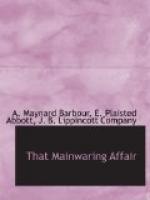He saw the crowd of upturned faces — incredulous, wondering, curious; he caught the mocking smile of Mrs. LaGrange and Ralph Mainwaring’s dark, sinister sneer; but he took little note of these. Like an arrow speeding to the mark, his glance sought the face of young Hugh Mainwaring. Their eyes met, and in that brief moment there was recalled to each a starlit night on one of the balconies at Fair Oaks, and the parting words of young Mainwaring to the secretary, “I’m your friend, Scott, and whatever happens, I’ll stand by you.”
With swift intuition each read the other’s thought, and, although there was no outward sign, Harold Mainwaring knew from that instant that there would be no retraction of that pledge.
The slight ripple of excitement died away while the witness was sworn, and the crowd listened with interest even to the preliminary interrogatories.
“Where were you born?” asked the attorney.
“In Melbourne, Australia,” was the reply, while deep silence awaited Mr. Sutherland’s next question.
“Mr. Mainwaring, I believe you are familiar with the will just read, are you not?”
“I am.”
“Please state when, and under what conditions, you gained your knowledge of this will.”
“I first learned that such a will had existed and knew its general terms, between five and six years since, through information given me by James Wilson. From data found a little over a year ago among the personal letters of the deceased Hugh Mainwaring, I ascertained that the will was still in existence, and on the 7th of July last I discovered the document itself and became personally familiar with its contents.”
At the mention of the name of Hugh Mainwaring and of the date so eventful in the recent history of Fair Oaks, the interest of the crowd deepened.
“Did you discover the document accidentally, or after special search for it?”
“As the result of a systematic search for more than a year.”
“Please state whether you took any steps leading to the discovery of this will during the four or five years immediately following your first knowledge of it; and if so, what?”
“As I first learned of the will soon after entering Oxford, my studies necessarily occupied the greater part of my time for the next three or four years; but I lost no opportunity for gaining all possible information relating not only to the Mainwaring estate, but more particularly to Hugh Mainwaring and his coadjutor, Richard Hobson. Among other facts, I learned that immediately after the settlement of the estate, Hugh Mainwaring had disposed of the same and left England for America, while about the same time Richard Hobson suddenly rose from a penniless pettifogger to a position of affluence.




